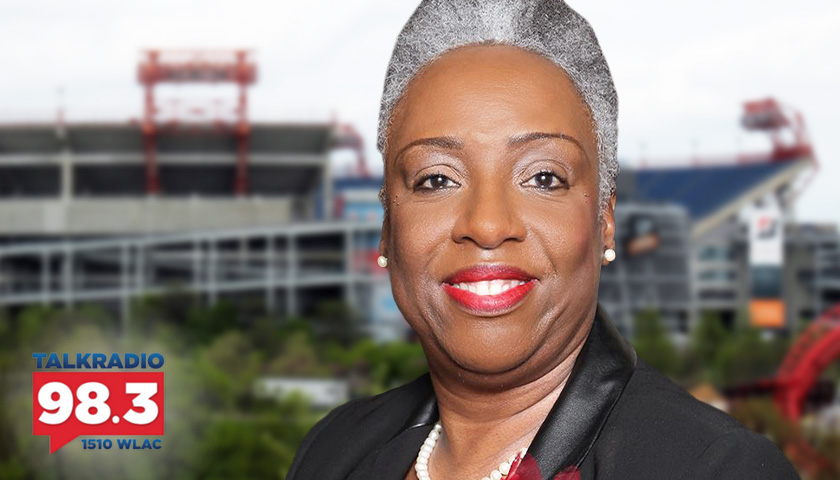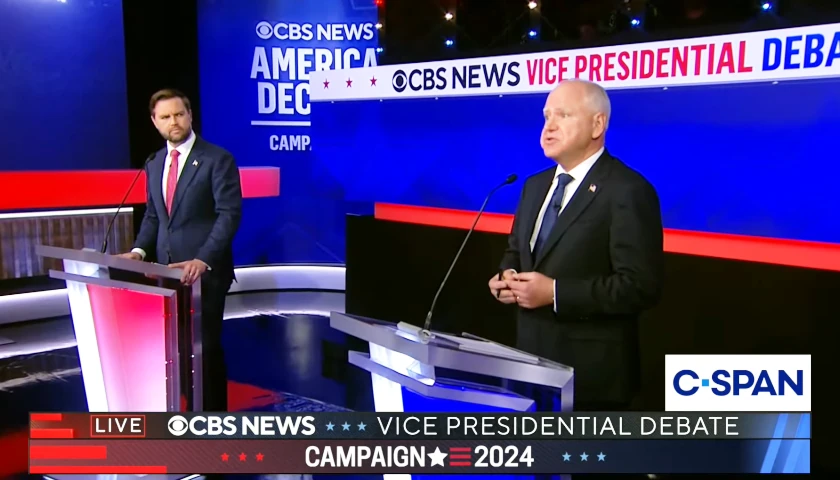Live from Music Row, Monday morning on The Tennessee Star Report with Michael Patrick Leahy – broadcast on Nashville’s Talk Radio 98.3 and 1510 WLAC weekdays from 5:00 a.m. to 8:00 a.m. – host Leahy welcomed Metro Nashville Council Member-At-Large Sharon Hurt to the newsmaker line to discuss her position on the proposed financing of the Titans stadium deal and whether or not it should privately funded on put on the taxpayers’ tab.
Leahy: We welcome to our newsmaker line Sharon Hurt, Metro Council Member-At-Large here in Davidson County. Welcome to The Tennessee Star Report, Councilmember.
Hurt: Good morning. Thank you so very much.
Leahy: I saw a report last month that you are considering running for mayor. Where does that stand right now?
Hurt: I’m still working with an exploratory committee evaluating the possibility and the potential. When I get in races and do things, I’m in it to win it. And I want to make sure that this is the right thing, the right course, the right time, and the right opportunity.
Leahy: The election is in August of 2023. The filing deadline is what? Late March, or early April. When will you make your decision?
Hurt: Again, that’s part of the decision of the exploratory committee to make that determination.
Leahy: Okay, but you’re looking at it, which is interesting.
Hurt: Yes.
Leahy: How long have you served on the Metro Council?
Hurt: So I am in my last year of a two-term position as Council-At-Large. It has been seven years and I guess a couple of months now.
Leahy: The big question, of course, facing the Metro Council right now is the Tennessee Titans stadium deal. And just for the record, so you know where we stand on that, I think it’s a bad deal for any number of reasons. But I would love to see a domed stadium here. I’d like to see it all privately financed.
Hurt: Right.
Leahy: What is your sense, and have you made a decision? Do you favor this deal? Do you oppose it?
Hurt: I basically favor the deal. First of all, I’m excited and happy to see that the state government and the local government are basically on the same page, and that is long overdue for us to start working together collectively for the greater good of our communities and our state.
So that, to me, is a plus. Because when we work together, we can get so much more accomplished. I think also that it’s been historic that decisions in Nashville have been made for the now, particularly looking at our old convention [center].
When we got that old convention constructed, it was basically outdated. So we had to move to get a new convention center, which was, of course, a challenge, and people didn’t understand it. But that convention center has now generated so much more revenue and has paid for itself, and it has also provided funding for our local Metro government.
The same thing happened with Church Street Center Mall, which was on Church Street, where the library now is. When we built that mall, the trend is that malls like that were declining, and it was something that we probably should not have done.
And here we come with this Titans stadium. The same thing happened. We should have built the stadium with the dome when we built that stadium. And now we’re in a position where we’ve got to upgrade it.
Because I believe that first-rate cities – and when we decided that we were going to have a professional football team, that we should have first-rate public facilities for our pro sports franchises, fans, and businesses and that they should be paid for with as much private money as possible. But I also believe that we have to have skin in the game. The public-private partnerships are a great way …
Leahy: So let’s ask this question on fairness. Is it fair to a Tennessean who lives in Chattanooga or Johnson City or Memphis for the state to pay half a billion dollars to support a stadium in Nashville?
Hurt: I think it does, because it’s going to generate the revenue that is going to be able to help the statewide community. So in order to have that possibility, you’ve got to find a way to generate that type of income.
And we see that this has worked in other states across the country, and we have people who visit Nashville from Chattanooga, Johnson City, and other places for activities that are held in the stadium.
The CMA Fest, we’ve got other concerts that will be there and other opportunities that a new stadium will bring. I’m actually excited. I wish there had been more engagement from our local administration of the council as well as the city because there are a lot of questions that need to be answered, and we want to make sure that the benefits that come from this reach every aspect of our city.
Leahy: Let’s ask you this. You’ve served on the council, what, since 2016? Was that your first year?
Hurt: 2015.
Leahy: 2015. When did you first learn that the city had an unfunded liability to renovate the stadium to first-class standards? Have you received a report, like, every year about how much that obligation is?
Hurt: No.
Leahy: Why not? Why didn’t the mayor give you that?
Hurt: Those are some of the questions that I think need to be answered. I think that’s the problem, because you got to build trust not only with the council but also with our community. And our council members are those who have that direct contact with the constituency.
And when people ask questions like this, we should be able to answer them, and therefore it needs to be informed answers. Those are some of the things that I have a problem with, is that we’ve got to be transparent with our constituency, and I think that it starts in the mayor’s office and they need to share that type of information.
Leahy: How did the cost to renovate the stadium, to quote these purported “first-class” standards, go from $300 million in 2017 to more than $1.7 billion today without the public being made aware of it?
Hurt: Well, you know, I know that there is a meeting that has been planned for the individuals who actually did the evaluation, but I think that it’s probably like with a car. You take your car to the shop and, you know, you got some problems with the brakes, okay?
But you get in there to the shop and not only do you need brake pads, but you also need rotors and all of that. So your bill goes from a $400 breakdown to a $1,500 all-around.
So I think the more you get into it, and the wear and tear that’s there over that time have just increased. And I also believe that inflation and just how expensive things are today are than it was back in 2008.
Listen to today’s show highlights, including this interview:
– – –
Tune in weekdays from 5:00 – 8:00 a.m. to The Tennessee Star Report with Michael Patrick Leahy on Talk Radio 98.3 FM WLAC 1510. Listen online at iHeart Radio.
Photo “Sharon Hurt” by Sharon Hurt.






Sharon Hurt for mayor? Hopefully NOT
My takeaway: Metro Council is completely clueless. I would bet most of these people’s personal finance’s are a wreck
.
Did I miss something? She is in favor of wasting more taxpayer money because she is running for mayor?